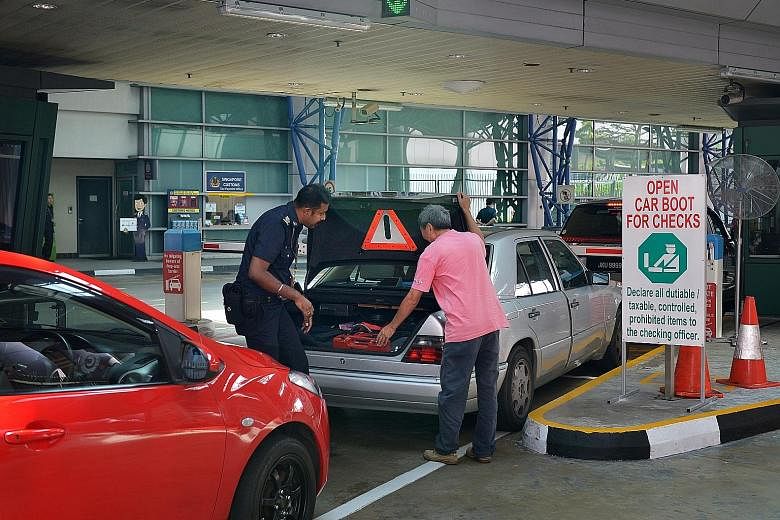Malaysia carried out more than 100 arrests of people suspected of having links to the Islamic State in Iraq and Syria (ISIS) terror group and foiled seven terrorist plots last year.
Indonesia made at least 74 terror-related arrests and prevented nine plots last year - yet an attack occurred in Jakarta on Jan 14 this year.
By the year end, 150 people now imprisoned in Indonesian jails for terror-related offences will be released. And at least 100 Indonesians have returned from Syria, while 200 others have been deported by Turkey while trying to get there.
These worrying developments in Singapore's immediate neighbours were cited by Home Affairs Minister K. Shanmugam in a speech to some 300 senior Home Team officers yesterday, where he outlined strategies Singapore was taking to counter the growing terror threat.
The rise of ISIS means that the threat of a terror attack here is at its highest level in recent times. So countermeasures have to be stepped up, he told the Home Team Leaders' Forum, an annual platform for the minister to update top officers of Home Team agencies on key issues and strategic directions for the year ahead.

"In 2015, we saw the terror threat morph into a very different, newer, much more powerful large monster," he said. "It is now a qualitatively different and much more dangerous threat. ISIS presents a far graver threat than Al-Qaeda and its affiliates ever were."
-
POSSIBLE TYPES OF ATTACK SINGAPORE FACES
-
1 Attacks that can be planned just outside Singapore, before the radicals come in and carry out the attacks here. Last November's Paris attacks were planned in Molenbeek, Belgium, a three-hour drive from the French capital. "We have several possible Molenbeeks around us," Home Affairs Minister K. Shanmugam said, noting that 200 million people pass through our checkpoints every year, with 145 million crossing Woodlands and Tuas checkpoints.
2 Attacks involving weapons which could be smuggled across the border for use by Singaporeans. This is why checks at checkpoints have to be very, very stringent, he said. "You can't trade security for convenience."
3 A lone-wolf attack by self-radicalised individuals. There has been a noticeable rise in such attacks worldwide, after ISIS spokesman Abu Mohammed al-Adnani told followers to carry out attacks in any way. Six such attacks abroad took place in 2014 after his statement, and 11 more took place last year - excluding foiled attacks.
Adnani also told followers: If you cannot find an IED (improvised explosive device) or guns, then smash people's heads with a rock, slaughter them with a knife, run them down with a car, throw them down from a high place, choke them. Mr Shanmugam said: "Security checks at Woodlands and Tuas checkpoints are not going to prevent these."
4 Foreign workers in Singapore can get radicalised, as the recent arrests and deportation of 27 Bangladeshis showed. The men had met every week to discuss taking up arms, circulated hardline material secretly among themselves, and carefully targeted fellow Bangladeshis to grow their numbers.
Last year, ISIS directed or inspired at least 56 attacks outside Iraq and Syria. Many targeted civilians, and Mr Shanmugam cited seven major attacks this year alone.
ISIS' control of large territories and oil resources has also earned it hundreds of millions of dollars.
It also uses social media skilfully, makes people believe they need to kill in the name of God, and has recruited over 30,000 foreign fighters - some 1,000 of them from South-east Asia.
"In scale, network, finances, propaganda, ISIS is at a different level and sophistication compared with other terrorist groups," he said.
ISIS also seeks to set up a regional caliphate that includes Singapore.
Mr Shanmugam had, in a speech two months ago, set out at length how the political backdrop in the region made it fertile ground for a climate of rising extremism.
Yesterday, he said: "We have to keep that political backdrop (in mind) because when politics fails, then everything else fails, and that is unfortunately happening."
He noted how in Malaysia, some of those arrested for ISIS links were commandos, police officers and civil servants. There was also a substantial threat posed by "clean skins" - people with no criminal records and who are not under the scrutiny of security agencies.
They come together through social media, and last April, Malaysia arrested 12 such militants who could get past immigration checks undetected if they travelled.
"Every day, we have more than 400,000 persons crossing our land checkpoints in Woodlands and Tuas both ways. In Woodlands alone, we have about 90,000 travellers via motorcycles and 80,000 travellers via cars, every single day," he said.
"You can work out for yourself the nature of the threat to us, from a would-be terrorist in Malaysia."
"When we complain about jams, one has got to take it in perspective, but it is very difficult to bring this point across to the broader public. The checks are necessary," he said.
As for Indonesia, he said some pro-ISIS groups are coming together under the banner of Jamaah Ansharul Khilafah. Other groups are also competing for attention, raising the risk of one-upmanship attacks.
The situation is exacerbated by shortcomings in Indonesian law, which currently does not allow for the detention of those who want to join ISIS. As a result, home-grown terrorists, individuals who are released, and those who have returned from Syria and Iraq are coalescing.

The last group poses a significant risk as they are battle-hardened with combat skills and violent tendencies, Mr Shanmugam noted.
"They want to destroy what there is and replace (it) with what there is in Iraq and Syria, and in territories in control by them," he said.
South-east Asian militants in Syria and Iraq are also actively encouraging militants in the region to strike.
They include ISIS' Malay Archipelago Unit leader Bahrun Naim, who has encouraged attacks in Malaysia, Indonesia and Singapore.
Last year, Thailand was hit by bombings in Bangkok's Siam Paragon mall in February, in Koh Samui in April, and at the Erawan Shrine in Bangkok in August.
Some Philippine and Malaysian militants have reportedly pledged allegiance to ISIS, which could lead to the setting up of a wilayat or province in southern Philippines.
Mr Shanmugam noted that extremist Uighur militants have also linked up with militant networks in this region, and as many as 3,500 Uighurs are fighting in Syria and Iraq.
Groups sympathetic to the perceived mistreatment of Uighurs in China could also target Chinese interests in South-east Asia and elsewhere. In Turkey, the Thai consulate was attacked after Thailand deported 109 Uighurs in July last year.
The Rohingya issue also has potential security implications, with ISIS targeting some 220,000 Rohingya refugees vulnerable to radicalisation in camps in Malaysia and Thailand. Mr Shanmugam noted that the Rohingya have attempted retaliatory attacks on Myanmar interests.
"There are multiple layers of threats in this region - complex, interwoven, fusing religion with domestic political grievances," he said. "And we are in the middle, an oasis of calm, and a prime target for all."


